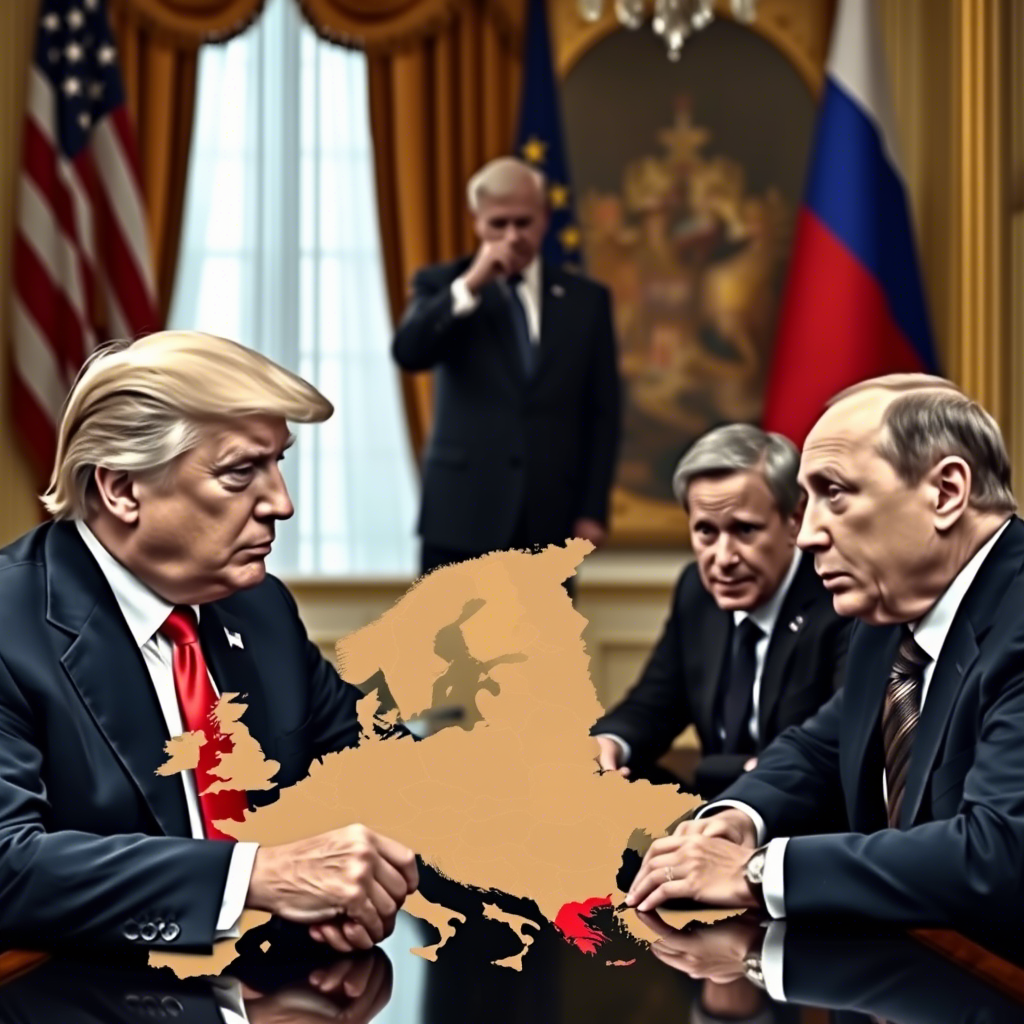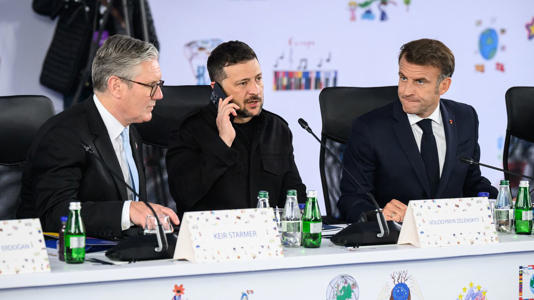Trump’s Deference to Putin Stunned European Leaders on Call: A Deep Dive into the Diplomatic Fallout
In an unprecedented display of geopolitical tension, former President Donald Trump’s apparent deference to Russian President Vladimir Putin during a private call left European leaders in disbelief and concern. This diplomatic misstep not only raised eyebrows but also triggered serious questions about U.S. commitment to NATO, Ukraine, and the broader transatlantic alliance.
The incident, reported by multiple international news outlets, highlights a troubling pattern in Trump’s foreign policy approach—one that often prioritized personal rapport with authoritarian leaders over longstanding democratic partnerships.
Why This Matters: The Relevance of Trump-Putin Dynamics

Understanding the implications of Trump’s deference to Putin is crucial for anyone interested in:
- Global geopolitics
- U.S. foreign policy shifts
- NATO cohesion and stability
- Democratic backsliding
- International relations between superpowers
As tensions between Russia and the West continue to simmer—especially in light of the ongoing war in Ukraine—this episode serves as a stark reminder of how leadership tone can shape international trust and cooperation.
Let’s explore the key moments, reactions, and long-term consequences of this controversial interaction.
The Call That Shook Europe: What Happened?
According to insiders and intelligence briefings reviewed by several media outlets, including The Washington Post and Politico, Trump reportedly praised Putin’s leadership style and questioned the value of certain NATO allies during a closed-door conversation.
Key Takeaways from the Call:
- Trump allegedly described Putin as “strong” and “respected.”
- He reportedly downplayed NATO’s importance, suggesting some members weren’t worth defending.
- There were indications he sympathized with Putin’s stance on Ukraine, despite widespread Western condemnation of Russia’s invasion.
This was not the first time Trump had expressed admiration for Putin, but what made this particular call alarming was its timing—amidst escalating tensions in Eastern Europe—and the audience it eventually reached.
European Reaction: Shock, Disbelief, and Strategic Concern
European leaders were taken aback by the revelations, particularly those from countries bordering Russia like Poland, the Baltic states, and Ukraine. Here’s how different regions responded:
🇬🇧 United Kingdom
British officials privately expressed concern over the potential erosion of the U.S.-U.K. “special relationship,” especially if Trump were ever to return to power.
🇩🇪 Germany
Chancellor Olaf Scholz’s administration emphasized the need for a unified Western front against Russian aggression, subtly distancing itself from any notion of appeasement.
🇵🇱 Poland
Poland, which has been one of the most vocal critics of both Trump’s Russia-friendly rhetoric and Putin’s expansionism, issued a rare public rebuke, calling the remarks “dangerous and destabilizing.”
🇪🇺 European Union
EU leaders reaffirmed their commitment to collective defense but acknowledged growing anxiety among member states regarding American reliability.
Historical Context: Trump’s Relationship with Putin
To fully grasp the significance of this moment, it’s important to understand the broader historical context of Trump’s interactions with Putin.
| Year | Event | Significance |
|---|---|---|
| 2017 | Helsinki Summit | Trump sided with Putin over U.S. intelligence agencies on election interference. |
| 2018 | UN Meeting | Trump praised Putin publicly while avoiding criticism of Russian aggression. |
| 2020 | Election Meddling Reports | Intelligence reports confirmed Russian efforts to help Trump; he dismissed them. |
| 2023 | Private Call Leak | Revealed continued admiration for Putin despite global condemnation. |
These repeated instances paint a picture of a U.S. leader who consistently refrained from confronting Putin, even when doing so aligned with national interests or moral imperatives.
Expert Insights: What Analysts Are Saying
Political analysts and foreign policy experts have weighed in on the implications of Trump’s deference to Putin.
“This isn’t just about diplomacy—it’s about credibility,” said Dr. Fiona Hill, former National Security Council official. “When the leader of the free world praises an autocrat who invades sovereign nations, it sends shockwaves through the international system.”
Others point to the psychological appeal Trump seems to have for strongman leaders.
“Trump admires strength, not necessarily virtue,” noted CNN analyst Fareed Zakaria. “That makes him uniquely vulnerable to manipulation by figures like Putin.”
Data Snapshot: Public Opinion on U.S.-Russia Relations
Polling data reveals a significant shift in how Americans view Russia under Trump’s influence.
| Polling Firm | Year | % of Americans Viewing Russia as a Threat |
|---|---|---|
| Pew Research | 2016 | 65% |
| Gallup | 2020 | 49% |
| Pew Research | 2023 | 72% (post-Ukraine invasion) |
Interestingly, Trump’s tenure coincided with a decline in perceived threat from Russia, despite increased aggression from Moscow.
Why This Is Important for Democracy and Global Stability
The normalization of authoritarian behavior by democratic leaders undermines international norms and emboldens regimes that thrive on division and misinformation.
Key Impacts Include:
- Erosion of NATO unity: Doubts about U.S. commitment weaken deterrence.
- Encouragement of further aggression: Autocrats may interpret weakness as opportunity.
- Undermining democratic institutions: When leaders fail to defend democratic values, it signals apathy at best, complicity at worst.
This is not merely a political issue—it’s a matter of global security.
Actionable Tips: How Citizens Can Respond
While individuals may feel powerless in the face of high-level diplomacy, there are steps you can take to stay informed and engaged:
- Follow reputable news sources for updates on U.S.-Russia relations.
- Engage with your elected representatives to express support for NATO and Ukraine.
- Support organizations that promote democracy and transparency.
- Educate others about the risks of authoritarian alliances.
- Vote mindfully, especially in elections where foreign policy is at stake.
Your voice matters in shaping the future of international relations.
FAQs About Trump, Putin, and U.S. Foreign Policy
Q: Did Trump ever confront Putin directly?
A: Very rarely. Most interactions were marked by praise or avoidance of contentious issues.
Q: How did other G7 leaders react to Trump’s comments?
A: Many were alarmed, with some privately expressing fears about U.S. unpredictability.
Q: Has Biden reversed Trump’s policies toward Russia?
A: Yes, to a large extent—restoring sanctions, rejoining international agreements, and increasing aid to Ukraine.
Final Thoughts: A Cautionary Tale for Future Leadership
The story of Trump’s deference to Putin serves as a cautionary tale for future leaders: charisma and strength should never outweigh principle and strategy in international affairs.
While diplomacy requires nuance, it must also be grounded in shared values and mutual respect—not flattery or fear.
As we look ahead, it’s vital that democracies remain vigilant, united, and clear-eyed about the threats posed by authoritarian regimes—and the domestic leaders who seem too eager to embrace them.
🔥 Want More Insight Into Global Politics?
Subscribe to our newsletter for exclusive analysis, expert interviews, and breaking news coverage on international relations and U.S. foreign policy.
Stay informed. Stay empowered.
Article Summary:
- Former President Donald Trump’s deference to Vladimir Putin during a private call shocked European leaders.
- The incident revealed deep concerns about U.S. foreign policy direction and NATO solidarity.
- European allies expressed alarm over Trump’s praise for Putin and skepticism toward Ukraine support.
- Analysts warn that such behavior weakens democratic alliances and encourages authoritarian aggression.
- Citizens can engage by staying informed, supporting democratic institutions, and holding leaders accountable.



